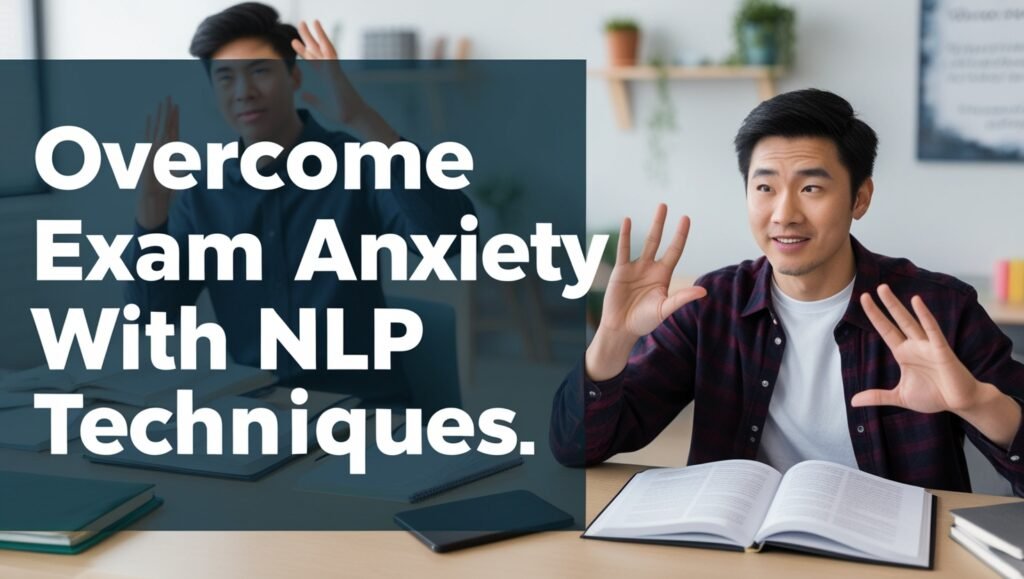
Introduction: Transform Stress into Success
Exams is a major source of stress and anxiety for students and you would also would have been experienced thin in your life if you have past academic life. But still If you are students, and you’ve ever found yourself overwhelmed by the pressure of impending exams, you’re not alone. Many students experience similar feelings, and it’s perfectly normal to be nervous. However, understanding and managing this anxiety is crucial for performing well and maintaining overall well-being. In this blog, we’ll explore proven Neuro-Linguistic Programming (NLP) techniques that can help you conquer exam anxiety and approach your exams with confidence.
Why Does Exam Fear and Anxiety Happen?\

Exams are high-stakes events that can trigger significant anxiety. But why does this fear take hold?
- Pressure to Perform Well: Exams often come with high expectations from parents, teachers, and even oneself. This pressure to succeed can create immense stress.
- Fear of Failure: The possibility of not performing well can lead to a fear of failure, which in turn increases anxiety.
- Overwhelm from ‘What Ifs’: Students frequently worry about hypothetical scenarios—What if I forget everything? What if I don’t answer a question correctly? This cycle of worry can amplify stress and create a barrier to effective performance.
Understanding these sources of anxiety is the first step toward managing it effectively.
Which Age of Students It Affects the Most

Exam anxiety is particularly prevalent among students aged 14 to 18 years. This period is marked by significant academic milestones and transitions, such as:
- Crucial Exams: Students in this age group face important exams that can influence their future educational and career paths. The weight of these exams adds to their stress levels.
- High Expectations: This stage of life involves high expectations from family, teachers, and peers, contributing to the pressure.
- Developmental Changes: Adolescents are undergoing numerous personal and emotional changes, which can make them more susceptible to anxiety.
This age group is at a pivotal point where managing stress effectively can make a significant difference in both academic performance and overall well-being.
Consequences of Unmanaged Exam Anxiety

If exam anxiety is not addressed, it can lead to several negative outcomes:
- Poor Academic Performance: Anxiety can impair concentration and memory, leading to subpar performance on exams.
- Health Problems: Chronic stress can manifest physically, causing headaches, stomachaches, and general fatigue.
- Sleep Disturbances: Stress can disrupt sleep patterns, further exacerbating anxiety and affecting daily functioning.
- Impact on Future Opportunities: Persistent anxiety can hinder academic achievements and limit future opportunities.
Recognizing these potential consequences underscores the importance of managing anxiety effectively.
How to Overcome Exam Anxiety with NLP Techniques

Neuro-Linguistic Programming (NLP) offers powerful techniques for managing and overcoming exam anxiety. Here’s how you can use NLP to transform your stress into success:
- Anchoring Technique:
- What It Is: Anchoring involves associating a physical gesture with a positive emotional state.
- How to Use It: Recall a positive memory where you felt calm and confident. Use a specific gesture, such as tapping your fingers together, while focusing on this memory. Practice this gesture whenever you start feeling anxious to evoke a sense of calm.
- Reframing:
- What It Is: Reframing involves changing your perspective on a situation.
- How to Use It: Instead of viewing exams as a threat, reframe them as an opportunity to showcase your knowledge and skills. This shift in perspective can reduce feelings of fear and enhance your confidence.
- Visualization:
- What It Is: Visualization involves creating a mental image of success.
- How to Use It: Close your eyes and imagine yourself walking into the exam room with confidence. Visualize yourself answering questions effortlessly and feeling proud of your performance. This technique helps prepare your mind for a successful outcome.
What Stops Us from Overcoming Anxiety

Despite the effectiveness of NLP techniques, several factors can hinder our ability to overcome anxiety:
- Self-Doubt: Doubting the effectiveness of these techniques can prevent consistent practice and implementation.
- Lack of Practice: NLP techniques require regular practice to be effective. Inconsistent application can limit their benefits.
- Resistance to Change: Adapting to new techniques and changing thought patterns can be challenging and may encounter resistance.
Overcoming these barriers involves committing to regular practice and maintaining an open mindset towards these techniques.
Take Action Now: Get More Help if Needed
If you’re struggling with exam anxiety and need more support, we have tailored courses designed specifically for students like you. Our courses offer in-depth strategies and personalized support to help you manage stress and excel in your exams.
Discover Channel : [Link to channel
By enrolling in our courses, you’ll gain access to expert guidance and proven techniques to transform your exam experience from stressful to successful. Don’t let anxiety hold you back any longer—take control of your stress and pave the way to academic success!
Conclusion
Exam anxiety is a common challenge for students, but with the right techniques and support, it is manageable. NLP offers effective strategies like anchoring, reframing, and visualization to help you overcome anxiety and approach exams with confidence. Remember, managing stress is a process that requires practice and commitment. By taking proactive steps and seeking additional support if needed, you can turn exam stress into a stepping stone for success.
Subscribe to our channel for more tips and techniques, and don’t forget to explore our courses for a more personalized approach to overcoming exam anxiety. You’ve got this!

